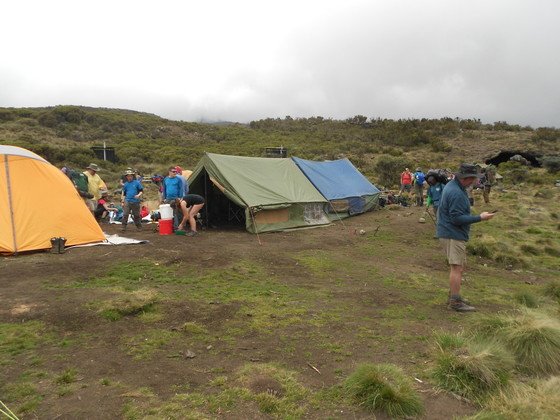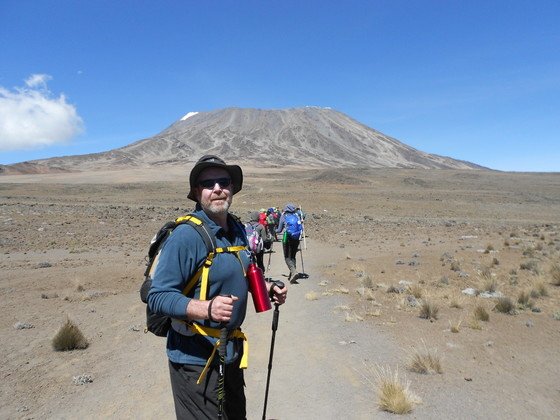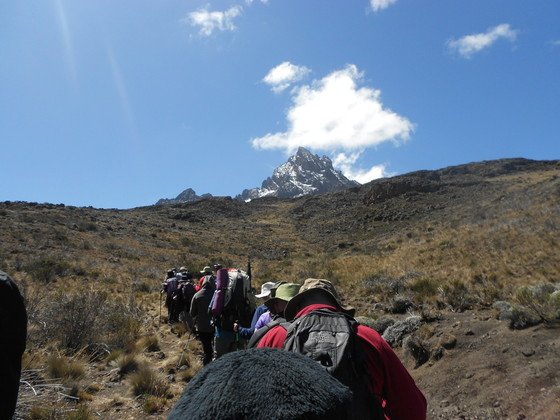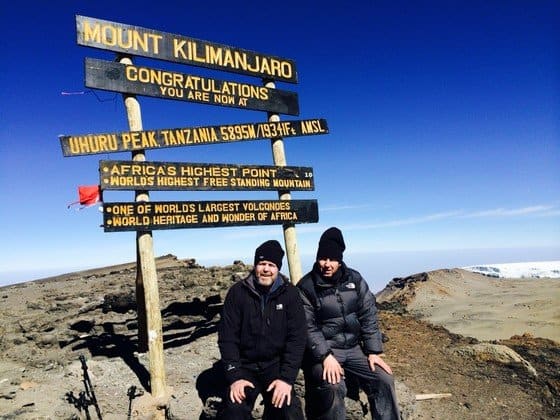The trek began at the Rongai route entrance of the Kilimanjaro National Park. Our group, which consisted of 21 “equally stupid”, I mean, “intrepid trekkers”, made our way over the next 4hrs (at a rather pedestrian pace set by the porters) to the Myers Camp Site at 2760 mtrs above sea level. “This is going to be easy” we thought! The night was spent camping under the African night sky which was beautifully illuminated by the seemingly endless number of stars. Fantastic.
Unfortunately sleep was not quite as fantastic, as it seemed as though our tents and mats (that had previously been set up by the porters) had been placed on top of all the rocks and stones that they could possibly find! I would say that 2 hrs sleep max was all that was had.

The next day saw us rise at 6am to calls of “washy washy”?? The porters bring round a small bowl of warmish water for each person to wash in. Well, this is where reality hit home.
This isn’t going to be a 5 star lavish experience and any dignity you may have wanted to reserve soon goes out the window when trying to keep as clean as possible! Enough said. Breakfast is served at 7am and consists of porridge, toast, eggs, more porridge, plus tea & coffee.
Following breakfast we set off again and over the next two days, trekking for around 8-10 hrs a day we passed through Kikelewa Camp (3600 mtrs) and onto Tin Hut Camp (4200 mtrs), which is at the base of Mawensi mountain.
This camp is a proper dust bowl and is situated in what can only be described as a desert type landscape, very baron and quite bleak. However, the view of the Mawensi peak above is really quite awe inspiring. Upon arrival at Tin Hut Camp, we take lunch, as we do every day at around 1-2pm.
This is a hot lunch and is generally a rice or pasta dish and in all honesty considering where you are the meals are not bad. Following lunch we go for an “acclimatisation climb” for 2hrs which takes us to a ridge midway up Mawensi and to an altitude of 4420mtrs. By now most of the party are experiencing some form of altitude related sickness.
This materialises in the form of headaches, nausea, dizziness and breathlessness. A number of, if not the vast majority of the trekkers (myself and Martin excluded), have opted to take Diamox which is medication which helps overcome the effects of altitude.
We decide to tough it out as we suffer from “real man syndrome”, which probably means we have cut our nose off spite our face!

We stay at the camp again that night (which is the only time you spend two nights in one camp) and the following morning head off on another acclimatisation trek, this time to the snow capped ridges of Mawensi, which takes us to an altitude of 4700mtrs.
At this altitude you definitely notice how quickly you become out of breath if you try and move too fast.
The porters, from day 1, have repeated the words “poly poly”, which mean “slowly slowly” and I now appreciate why they purposely set the pedestrian pace to start with, which is to get you used to it for later and the summit climb. The following morning we head off on a 4hr trek across what they call “The Saddle”, which is the flat stretch of land between the base of Mawensi and the base of Kilimanjaro.
This is approximately a 9km walk which is across open, baron, desert land, and which takes us to Kibo Camp from where we will make our summit attempt later that evening. Well, this is it.
After dinner we are told to go to bed early and get a couple of hours sleep as we will be woken (yeah right as if you can go to sleep) at 11 to prepare for the summit climb at midnight. On Wednesday the 11th of February at midnight and following a quite serious briefing from our trek guide we finally began to climb/trek Kilimanjaro.
You head off in a line and slowly zig zag up the mountain. In all honesty all you have to get yourself “in the zone” and simply focus on the pair of boots in front of you and follow on relentlessly for what seems an age.
At one point I felt particularly dizzy and seemed to hallucinate for a short while but you slap yourself out of this and continue. Martin I know found that his breathing was particularly laboured and had to dig deep to maintain progress.
Many of the others in our party were struggling to cope with various symptoms of altitude sickness and the neat line of trekkers soon became separated and distanced from one another as the individuals pace slowed to allow them to cope, or not, as the case may be.
The porters, guide and doctor at this point were superb in recognising people having difficulties and ensured that they were encouraged to rest, eat, and drink accordingly to allow them to continue…hopefully.

Around 6am, mid way up Kilimanjaro the night sky changed and deep orange peaked over the horizon as the sun rose.
This lifted the spirits no end and once the sun rose clear and the day brightened and blossomed, the view across Tanzania and the neighbouring plains of Kenya was unforgettable. Eventually we reached Gillians Point (5685 mtrs), which is known as the false summit, around 12 hrs after setting off. However, we were then informed that the true summit, Uhuru Point (5895 mtrs), was further around the rim of the crater and another 210 mtrs higher in altitude.
This actually only looked a very short distance but proved to be a further 1 ½ hrs away and which was bloody tough going due to the reduced oxygen levels! This literally was…”take a laboured step and take a breath”…”take a laboured step and take a breath”…Poly Poly !! When Martin and I got there we were pretty knackered but ecstatic to have reached our goal.
It’s a fantastic, satisfying, and a quite overwhelming and emotional feeling. Attached below is a photo of Martin and I at the summit, this is the shot we wanted and what we had trained for since April 2014 when the trek was originally organised.

spending only probably 15 minutes at Uhuru Point we began the long decent back to Kibo Camp. All in all from the time we started the climb to the time we got back to camp it took 20hrs.
Quite a mission. To cap it all off, once back at Kibo, we were told that we then had to trek back across the saddle for another 4hrs to a different camp site where we would spend the night prior to one more 18k trek the next day back to the Rongai Gate and a well deserved couple of beers ! That’s one off the bucket list….thankfully.
What’s next, hmmm? I would like to take the opportunity at this point on behalf of Martin and I and indeed the Birdshot Uveitis charity to thank again, all who have kindly dug deep and sponsored the trek.
We currently, without taking into account the gift aid, have raised £18,860.00 but have another approx. 3k pledged, and therefore expect to exceed the £20.000 mark! This is absolutely brilliant, well done everybody! If, reading this, you feel inspired to contribute, you can still do so by visiting www.justgiving.com/johnfhunt! Many thanks! Martin and Bill